Color of Night Blu-ray Movie
HomeColor of Night Blu-ray Movie 
Mill Creek Entertainment | 1994 | 139 min | Rated R | No Release Date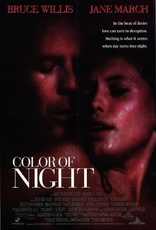
Price
Movie rating
5.7 | / 10 |
Blu-ray rating
| Users | 0.0 | |
| Reviewer | 2.5 | |
| Overall | 2.5 |
Overview
Color of Night (1994)
A psychiatrist is haunted by his failure with a suicidal patient. While on a break from his own practice, he visits a friend and colleague who, soon thereafter, is brutally murdered. Hunting for the killer, he finds himself taking over his colleague's therapy group and simultaneously entering into an intense romance with a mysterious beauty who appears and disappears without explanation.
Starring: Bruce Willis, Jane March, Rubén Blades, Lesley Ann Warren, Brad DourifDirector: Richard Rush
| Erotic | Uncertain |
| Romance | Uncertain |
| Drama | Uncertain |
| Film-Noir | Uncertain |
| Crime | Uncertain |
| Mystery | Uncertain |
| Thriller | Uncertain |
Specifications
Video
Video codec: MPEG-4 AVC
Video resolution: 1080p
Aspect ratio: 1.85:1
Original aspect ratio: 1.85:1
Audio
English: DTS-HD Master Audio 2.0 (48kHz, 24-bit)
Spanish: Dolby Digital 2.0
Subtitles
English SDH
Discs
50GB Blu-ray Disc
Single disc (1 BD)
Playback
Region A (B, C untested)
Review
Rating summary
| Movie | 3.0 | |
| Video | 1.5 | |
| Audio | 3.0 | |
| Extras | 0.0 | |
| Overall | 2.5 |
Color of Night Blu-ray Movie Review
Not Seeing Red
Reviewed by Michael Reuben June 19, 2013The story behind Richard Rush's Color of Night is at least as interesting as the loopy tale on screen. After the critical acclaim and award nominations showered on Rush's 1980 sleeper, The Stunt Man, the director seemed poised for a major career boost. Instead, he would labor for years over the screenplay of Air America, only to see it taken out of his hands by a new regime at MGM, re-cast with Mel Gibson and Robert Downey Jr. and rewritten into something he barely recognized. At about that time, super-producer Andrew Vajna, whose former company, Carolco, had produced such major hits as the original Total Recall, Terminator 2 and the Rambo series, approached Rush with an attractive proposition: direct Bruce Willis and then rising British starlet Jane March (The Lover) in a psychosexual thriller written by two up-and-coming screenwriters, Billy Ray (The Hunger Games) and Matthew Leonard (Runaway Jury). Rush took the job and has repeatedly said that production ran smoothly. The trouble began during editing. He and Vajna clashed over how to shape the film, and Rush did not have final cut. He did, however, have the right to demand simultaneous previews of their two versions—Vajna's 121-minute edit and Rush's 139-minute cut—with the winner to be determined by preview scores. When Rush's cut scored higher, Vajna tried to fire him. When the Director's Guild intervened, Vajna started a PR war in the press that was sufficiently ugly to prompt Steve Railsback, star of The Stunt Man, to write the Los Angeles Times in Rush's defense. Rush capitulated after a major heart attack (his second) sidelined him in the hospital for bypass surgery. The true meaning of "final cut", he would later say, is "the one they make in your chest". He agreed to let Vajna's version of Color of Night be released to theaters, as long as his cut went to video. Then he shocked Vajna by getting an R rating for the director's cut, even though its sex scenes were more explicit. Released on August 19, 1994, Vajna's Color of Night was critically panned, disappeared quickly from the box office and won the Razzie for 1994's worst picture. Rush was able to obtain some favorable reviews for his video version, which appeared on VHS and laserdisc the following year. Rush's version has lived on, while Vajna's has largely disappeared. 2018 Update: Vajna's cut has now been released by Kino Lorber, accompanied by a re-release of Rush's. A review and comparison can be found here.
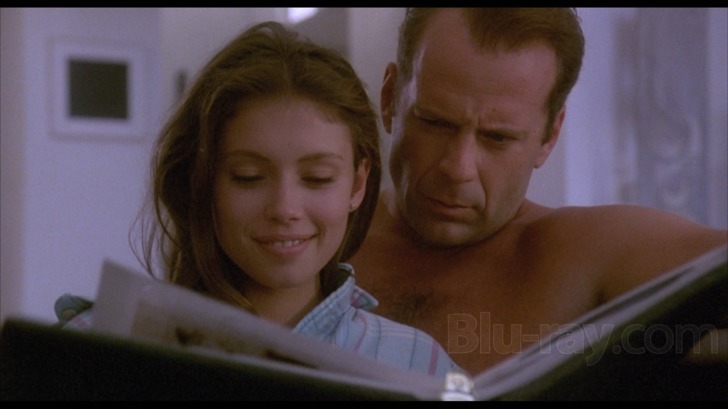
Although I have great affection for Color of Night, I would never try to defend it as an effective murder mystery. Most of its "secrets" are obvious, and the story itself is ludicrous. Then again, I've often wondered whether or not these flaws aren't intentional. The murder plot in Vertigo doesn't bear close scrutiny, and Hitchcock gives it away long before the end, but no one cares, because the film is about something else entirely. One often gets the sense that Rush, too, was trying to make Color of Night transcend its creaky storytelling and become a fever dream about "something else". But he never got there. Still, since we live in a spoiler-allergic world, I will do my best in the following discussion to preserve the film's secrets, such as they are. Bruce Willis plays Bill Capa, a New York psychotherapist who gravely misjudges a patient's state of mind, taking her much less seriously than her condition warrants. She commits suicide during a session, and the shock leaves Capa so psychologically devastated that he can no longer see the color red. It's a psychic defense against the memory of his patient's blood. It's also, as Capa's former teacher points out, a symbol of his own emotional denial. Capa shuts up his practice and takes several weeks' holiday in L.A. with his old friend and former fellow student, Bob Moore, who is played by Scott Bakula with just the right touch of cocky self-satisfaction you would expect from a shrink who has made a fortune on a self-help book. Moore lives in a large architectural wonder of a house in Malibu filled with gadgets, art and an inordinate number of cameras and alarms. When Capa asks about all the security, Moore admits that he's been receiving threats for several months. Moore's practice includes a weekly group therapy session that is attended by a collection of caricatures from a textbook on neurotics. The group includes a narcissist, a kleptomaniac, a stammerer, an obsessive-compulsive and an individual with anger management issues. Moore strong-arms Capa into joining a group session as an observer, but only afterward does he tell his friend that he believes someone in the group is responsible for the threats he's been receiving. Shortly afterward, Moore is murdered. His case is assigned to the L.A.P.D.'s Detective Martinez, who is played by Rubén Blades with scene-stealing relish. (He's the funniest character in the film.) I don't want to provide much detail about the group sessions, because it's best to let first-time viewers discover for themselves what Martinez derisively calls these "daffodils". Just before Capa's patient committed suicide, he was speaking to her about the limited view one has while peeping through a keyhole, and the entire film is full of views through distorting glass, doorways or other openings and double (or triple) reflections. Capa's inability to see red is only the most obvious limit on perception in the film. Everyone in the group has major blind spots—and they're not the only ones. At Martinez's urging, and with much misgiving, Capa takes over the group on a temporary basis. At about the same time, and just by chance (or is it?), he meets a beautiful young woman named Rose (March). They quickly fall into a passionate affair for which the explicit love scenes were the film's initial calling card. But there's something odd about Rose. She appears out of nowhere and disappears just as suddenly. And is it just a coincidence that Capa's relationship with Rose also marks the beginning of threatening incidents like the rattlesnake he finds in his mailbox? The true fault in Color of Night isn't a matter of credibility or plot logic. It's the failure to connect Bill Capa's quest for redemption to the evolution of the thriller plot, as Hitchcock so memorably had James Stewart's quest for redemption connect to—indeed, overwhelm—the murder mystery in Vertigo. Capa does eventually get back his vision of the full color specturm, but it's almost an afterthought to an eye-rolling resolution of a plot that has, by that point, long since snapped the suspension of disbelief. Far from becoming a hero, tragic or otherwise, Capa ends up being reduced to just another "daffodil".
Color of Night Blu-ray Movie, Video Quality 
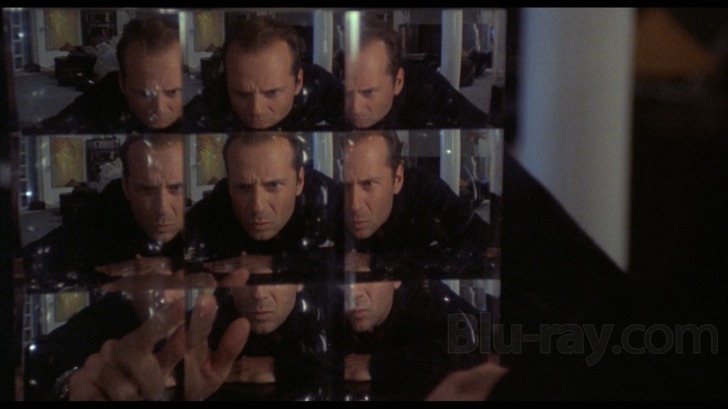
Color of Night was released by Disney's Hollywood Pictures division. Given the erratic quality of Disney's own catalog releases on Blu-ray, it is no surprise that the quality of the masters they provide to Mill Creek is all over the map. The master provided for the 1080p, AVC-encoded presentation on this double feature Blu-ray is among the weakest I have seen in this series and certainly does not do justice to the late Dietrich Lohmann's (Deep Impact) colorful photography. The source material is in poor shape, with plenty of nicks, speckles, scratches and splotches. The overall image is soft, poorly defined and noisy, although here and there the image stabilizes for the duration of a few shots, e.g., in the scenes where Willis and March are in the swimming pool together. Colors are generally weak and less than fully saturated. A notable (and important) example occurs in several key transitions between gray and red, as the film shifts between Capa's crippled vantage and a more objective point of view. These changes should strike the eye forcefully, but they don't register with the appropriate impact, because the colors are washed out. Overall, this strikes me as an old transfer prepared for DVD and never updated. The results on Blu-ray are superior to what appeared on DVD, which suffered from such severe edge enhancement that halos were apparent even on small screens, but it is far from the quality that Blu-ray has to offer even from weak source material.
Color of Night Blu-ray Movie, Audio Quality 
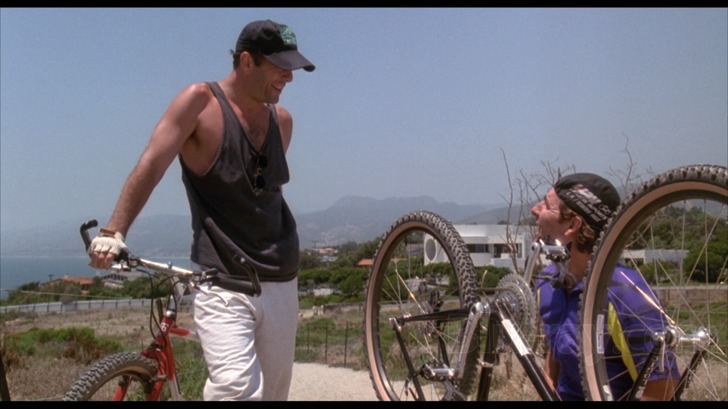
According to IMDb, Color of Night was released to theaters with a Dolby Digital soundtrack, which was becoming the norm for major theatrical releases in 1994. However, Rush's preferred cut, which is the only version that has been available on video, has never had more than a stereo track. Even the DVD released by Disney's Buena Vista Home Video in 1999 had only DD 2.0. If the studio spent the money to provide a 5.1 mix for Vajna's theatrical version, they obviously were unwilling to go any further after it flopped at the box office. The Blu-ray offers the standard 2.0 track as lossless DTS-HD MA 2.0, and it gets the job done. The dialogue is clear, as are the essential sound effects. However, there is virtually no surround presence or even much sense of stereo separation. The score by Dominic Frontiere (who also scored The Stunt Man) sounds good enough, though the reproduction lacks any depth or subtlety. The track is dominated by variations on the title song "The Color of the Night", which is performed over the closing titles by Lauren Christy and was the only element from the film nominated for anything resembling a genuine award (a Golden Globe).
Color of Night Blu-ray Movie, Special Features and Extras 
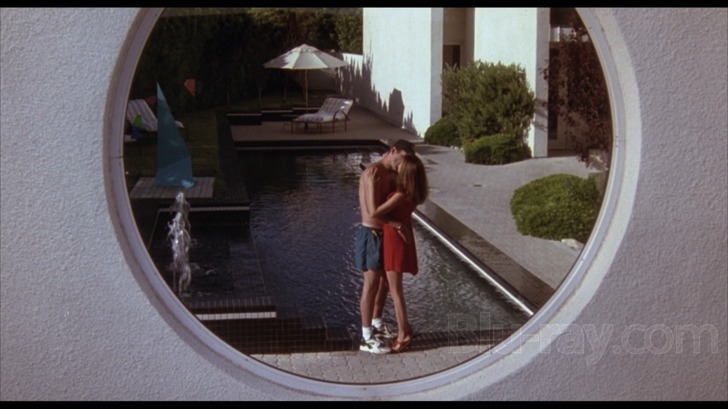
A trailer (480i; 1.33:1) is available from a popup menu during playback.
Color of Night Blu-ray Movie, Overall Score and Recommendation 
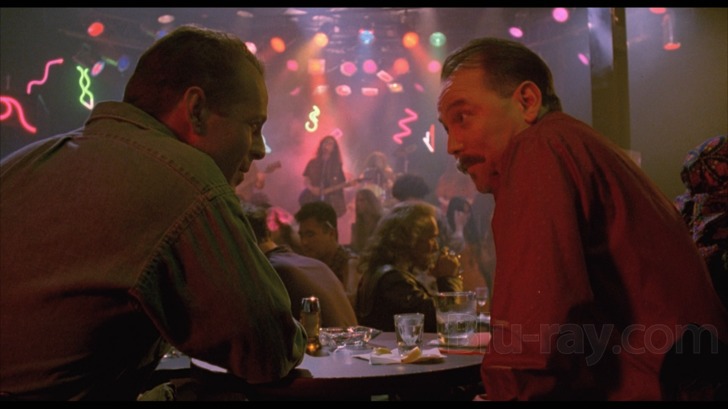
Color of Night falls under the heading of "guilty pleasure", but it's also the kind of bad movie that reflects good intentions and serious effort by a director of genuine talent. Now in his eighties, Richard Rush is unlikely to make many more films (if any), and everything in his regrettably small body of work deserves a look. Someday Disney may give the film (along with many others in its vaults) a decent treatment, but until then this version from Mill Creek appears to be the best we can get.
Similar titles
Similar titles you might also like
(Still not reliable for this title)

Killing Me Softly
2002

9 Songs
2004

Original Sin
2001

Sex and Lucía
Lucía y el sexo | Unrated Director's Cut
2001

The Brown Bunny
Limited to 250 sets / Signed & Numbered
2004

The Loft
2014

Basic Instinct
Unrated Director's Cut
1992

Cruising 4K
Limited Edition
1980

Body of Evidence
1993

Basic Instinct 2
Collector's Edition
2006

Body Heat
1981

Wild Things: Foursome
Unrated Edition
2010

The Crimson Kimono
Limited Edition to 3000
1959

Bad Timing
Bad Timing: A Sensual Obsession
1980

Sliver 4K
Slipcover in Original Pressing
1993

Jennifer 8
Special Edition
1992

Whispers in the Dark
1992

Whirlpool
Limited Edition to 3000
1950

Blue Velvet 4K
1986

Dead Again
1991
